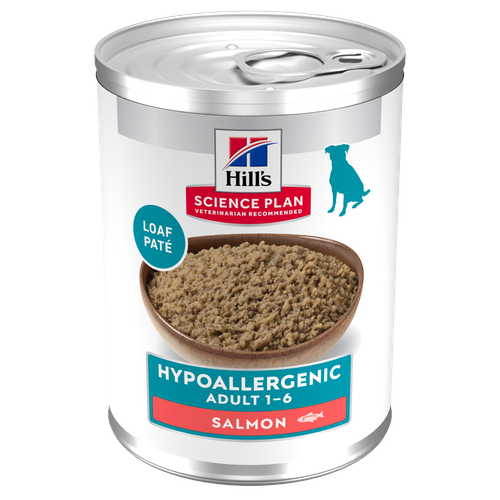
-
Find the right food for your petTake this quiz to see which food may be the best for your furry friend.Find the right food for your petTake this quiz to see which food may be the best for your furry friend.Featured products
 Mature Adult Dog Food
Mature Adult Dog FoodHill's Science Plan Mature Adult Multipack Wet Dog Food with Chicken & Beef are complete premium pet foods for mature adult dogs from 7 years. Your dog will love these deliciously smooth and savoury minced loaves, formulated to deliver the appropriate amount of energy to support the needs of adult dogs.
Shop Now Adult Wet Dog Food with Beef
Adult Wet Dog Food with BeefHill's Science Plan Adult Multipack Wet Dog Food with Chicken, Beef & Turkey are complete premium pet foods for adult dogs from 1 year. Your dog will love these deliciously smooth and savoury minced loaves, formulated for balanced nutrition and overall health.
Shop Now Puppy Food
Puppy FoodHill's Science Plan Puppy Multipack Wet Dog Food with Chicken & Beef are complete premium pet foods for growing puppies from weaning until 1 year old and for pregnant and nursing dogs. Your puppy will love these deliciously smooth and savoury minced loaves, formulated for balanced nutrition and overall health.
Shop NowFeatured products Adult Multipack Wet Cat Food with Beef, Ocean Fish & Chicken
Adult Multipack Wet Cat Food with Beef, Ocean Fish & ChickenTender chunks in gravy for cats, with high-quality protein to maintain lean muscle. With vitamin E and omega-3s & -6s for healthy skin and balanced minerals to support healthy vital organs.
Shop Now Light Adult Multipack Wet Cat Food with Chicken & Ocean Fish
Light Adult Multipack Wet Cat Food with Chicken & Ocean FishTender chicken chunks in gravy for cats, with L-carnitine and fewer calories for ideal weight management. Packed with high-quality protein, omega-6s, and vitamin E for shiny fur and healthy skin.
Shop Now Mature Adult Wet Cat Food with Chicken
Mature Adult Wet Cat Food with Chicken
Tender chicken chunks in gravy for mature adult cats. Made with easy-to-digest ingredients, high-quality protein for lean muscle maintenance and antioxidant vitamins C+E for optimal health.
Shop Now -
Dog
- Dog Tips & Articles
-
Health Category
- Weight
- Food & Environmental Sensitivities
- Urinary
- Digestive
- Joint
- Kidney
-
Life Stage
- Puppy Nutrition
- Adult Nutrition
- Senior Nutrition
Cat- Cat Tips & Articles
-
Health Category
- Weight
- Skin & Food Sensitivities
- Urinary
- Digestive
- Kidney
-
Life Stage
- Kitten Nutrition
- Adult Nutrition
Featured articles The Incredible Science Behind Your Pet's Microbiome
The Incredible Science Behind Your Pet's MicrobiomeLearn what your pet's microbiome is, how it contributes to your pet's gut and overall health, and why nutrition is important in maintaining healthy microbiomes.
Read More The Right Diet For Your Pet
The Right Diet For Your PetIn people, the right diet is very important. If you are eating the wrong way for your metabolism, activity level, age and lifestyle you could end up with health issues.
Read More Show some love with wet foods: a great choice for pets with health issues
Show some love with wet foods: a great choice for pets with health issuesShow some love with wet foods: a great choice for pets with health issues.
Read More -


Is your dog itching a lot? Excessive dog itching can be distressing for both you and your pet, especially if they sleep in the same room as you. From constant licking and scratching to red, irritated skin, these signs often point to an underlying issue. Pet parents who sleep with or near their dog will be familiar with broken sleep due to the thumping of paws and the sound of itching and shaking. Let’s explore what might be causing your dog’s discomfort, how to tell the difference between similar signs, and what steps you can take to help your dog feel better.
What are the most common signs of dog skin problems?
The severity of signs can vary, depending on the underlying cause, but the most common signs of dog skin problems are:
Scratching
Head shaking. This may be due to things like parasites on or in the ear, but can also be due to inflamed ears from a food or environmental allergy.
Chewing skin
Excessive licking
Hair loss and bald patches
Red, inflamed areas of skin
Scabs and crusts
Pustules and weeping sores
Because of self-trauma, lots of skin problems in dogs can present with almost identical signs, and it can take some time to get to the bottom of things. And we have to remember that some unfortunate dogs may have more than one skin issue at a time.
What are the most common causes of itchiness in dogs?
Parasites
- Fleas. Lots of people feel it reflects badly on them if their dog has fleas, but it's an inevitable part of a dog’s life. Fleas tend to spend their time round the neck, head and the base of the tail. If you notice your dog biting, chewing or scratching in these areas, fleas are the first thing to rule out.
A good trick to see if fleas are a problem is to look for flea dirt. Comb your dog’s fur onto a piece of white tissue. If you see dark specks, moisten the paper. If it’s dirt, the colour won’t change, but if it’s flea dirt (which is their poo full of blood), the tissue will go red.
Some dogs are very sensitive to flea bites because they are allergic to fleas’ saliva, so they may get itchy even with only the odd bite.
- Mites can cause very intense itchiness. Most mites aren’t visible with the naked eye, so your vet may need to do skin scrapes to get a diagnosis. Some mites are also contagious to humans, so look out for signs on you and your family and see a doctor if need be.
- Ticks loiter around in the countryside and wait for animals to brush past them and then hitch a ride. Ticks can cause local skin irritation where they bury their heads in the skin to feed. They can also spread certain diseases, so shouldn’t be taken lightly.
Atopic dermatitis
Also known as atopy, this is a common cause of itching in dogs. Atopic dermatitis is an allergy to environmental triggers, such as pollen, dust, dust mites, grasses and any number of other things. Many dogs with atopy are allergic to several different things. If your dog is allergic to pollen and plants, you might find they itch more in summer, while other allergens can cause itchiness all year round, such as dust mites or moulds.
Some breeds of dog are more prone to atopy than others. These include Labradors, golden retrievers, West Highland white terriers, boxers, English bulldogs, French bulldogs (or Frenchies as they are also known), Jack Russell terriers and poodles, to name a few.
Food allergy
Adverse food reactions can cause skin disease as well as intestinal problems. The most common food allergies in dogs are beef, chicken, dairy and wheat. Your vet may suggest a special diet trial for 12 weeks if a food allergy is suspected as the cause of your dog’s itchiness. Find more about how food allergies can affect your dog.
Infection
Bacterial skin infections can make your dog itchy. It can be a bit of a “chicken and egg” situation because dogs that are scratching a lot traumatise their skin, and this can lead to an infection secondary to the initial cause. In some cases, though, it’s simply an infection, and treatment with appropriate antibiotics will clear it up and stop the itching. Fungal infections can occur too.
How are dog skin problems diagnosed?
Getting to the bottom of why your dog is itching needs a logical, stepwise approach as your vet does their detective work and rules things in and out. This can take a bit of time, unless the cause is simple and obvious, so be patient with your vet. The normal process for diagnosis is:
Clinical exam. Distribution of the itchiest patches of skin and the lesions can give an idea in some cases. Your vet will also look for obvious signs of fleas or visible mites, like “walking dandruff”. Find out more about Dog Dandruff and how you can support your dog.
Skin scrapes, smears and hair plucks to rule out other mites and fungal infections.
Food elimination trial to rule out a food allergy. Your dog will need to be fed a therapeutic diet for 12 weeks and nothing else.
- Skin or blood tests for atopy.
Treatment and remedies for your itchy dog
It’s tempting to try to provide relief for your dog’s itching at home, but this can be difficult and may delay diagnosis and allow their skin disease to worsen.
Usually, the best course of action is to see your vet as soon as you are convinced there is a problem. Your vet may be able to provide immediate, welcome relief for your dog while the diagnostic process gets started. Treatments will depend on the underlying cause but may include some or all of the following:
Parasite treatment
Fleas are by far the most common cause of itching in dogs and will be ruled out first. Depending on what parasites your dog has, your vet may prescribe drops, a spot-on treatment or medicated shampoos. You may also need to treat your home.
Medications
Anti-inflammatory, antibiotic or antifungal medications may be given. Or all three! Your vet may also prescribe oral antibiotics if topical treatments are not going to be enough. Your dog may have an injection of an anti-inflammatory to give relief from the itching and break the scratch cycle.
Diet change
For dogs with food allergies and atopy, diet change can make a huge difference. Therapeutic diets for food allergy sufferers are curative for the vast majority of dogs. There are also diets available that have anti-inflammatory properties and even help restore the skin barrier function in atopic dogs. Your vet will be able to guide you to the best diet for your individual dog.
Allergy relief
Dietary change, antihistamines, or environmental management may be needed depending on what your dog is allergic to.
Immunotherapy
This is where, following testing for environmental allergies, a special, tailor-made programme is formulated for your individual dog. This is a process of desensitisation, or hypo-sensitisation as it’s also known, and involves injecting very gradually increasing levels of allergens over several months until your dog is desensitised. This works very well for some dogs, but the results can be variable.
Dog skin problems and itching can be draining for you and your dog, but with modern medicine and a logical, cooperative approach, many dogs with skin disease can lead an itch-free, happy life. Remember to always seek veterinary advice as soon as you think there is an issue. The sooner you get a diagnosis, the sooner your dog gets that so very welcome relief, and you can sleep again!
Dog itching FAQs
Why does my dog keep scratching even though I don’t see fleas?
This could be for a number of reasons. Fleas may still be the culprit. They are not always obvious and just a bite or two can spark issues in sensitive dogs. Other causes could be atopy, food allergies, other parasites and infections.How can I tell if my dog has a food allergy?
Your vet will give you a special, therapeutic food to feed your dog for around 12 weeks. If your dog stops itching, you can either stay on that food or carry out food trials to see what they are allergic to.What can I give my dog to stop itching naturally?
Omega three oils can help, but if your dog is itching excessively, you should see your vet. Delaying may let the self-trauma get worse and complicate diagnosis even more.- How long does it take for a food trial to show results?
Ideally, the trial should last a minimum of 12 weeks to allow time for the skin to fully heal, but many dogs start to show improvement much earlier, especially if they have gastrointestinal issues too.


One of our staff authors prepared this article for you
Reviewed by Dr. Karen Shenoy DVM and Dr. Emma Milne BVSc FRCVS
Related products

Hill's Science Plan Adult Multipack Wet Dog Food with Chicken, Beef & Turkey are complete premium pet foods for adult dogs from 1 year. Your dog will love these deliciously smooth and savoury minced loaves, formulated for balanced nutrition and overall health.

Hill's Science Plan Mature Adult Multipack Wet Dog Food with Chicken & Beef are complete premium pet foods for mature adult dogs from 7 years. Your dog will love these deliciously smooth and savoury minced loaves, formulated to deliver the appropriate amount of energy to support the needs of adult dogs.

Hill's Science Plan Hypoallergenic Adult Wet Dog Food with Salmon is a complete premium pet food for all adult dogs from 1 year. This savoury tinned loaf is specially formulated for dogs with delicate skin and stomachs. It features a single novel animal protein source and is grain-free.

Hill's Science Plan Puppy Multipack Wet Dog Food with Chicken & Beef are complete premium pet foods for growing puppies from weaning until 1 year old and for pregnant and nursing dogs. Your puppy will love these deliciously smooth and savoury minced loaves, formulated for balanced nutrition and overall health.
Related articles

How, when and what to feed your new puppy is an important decision, learn more about the things to consider for feeding your puppy.

Learn about the potential health risks of a raw diet for dogs and why they aren't the best option for your pup or you.

Many human foods are dangerous to dogs. Read about 5 of the worst toxic food offenders that can kill your dog - and how much it takes to hurt them.

Learn effective tips for feeding a dog that's a picky eater and ensure proper nutrition for a finicky eater. Discover tips for pet parents at Hill's Pet UK.

Put your dog on a diet without them knowing
Our low calorie formula helps you control your dog's weight. It's packed with high-quality protein for building lean muscles, and made with purposeful ingredients for a flavourful, nutritious meal. Clinically proven antioxidants, Vitamin C+E, help promote a healthy immune system.
Put your dog on a diet without them knowing
Our low calorie formula helps you control your dog's weight. It's packed with high-quality protein for building lean muscles, and made with purposeful ingredients for a flavourful, nutritious meal. Clinically proven antioxidants, Vitamin C+E, help promote a healthy immune system.

